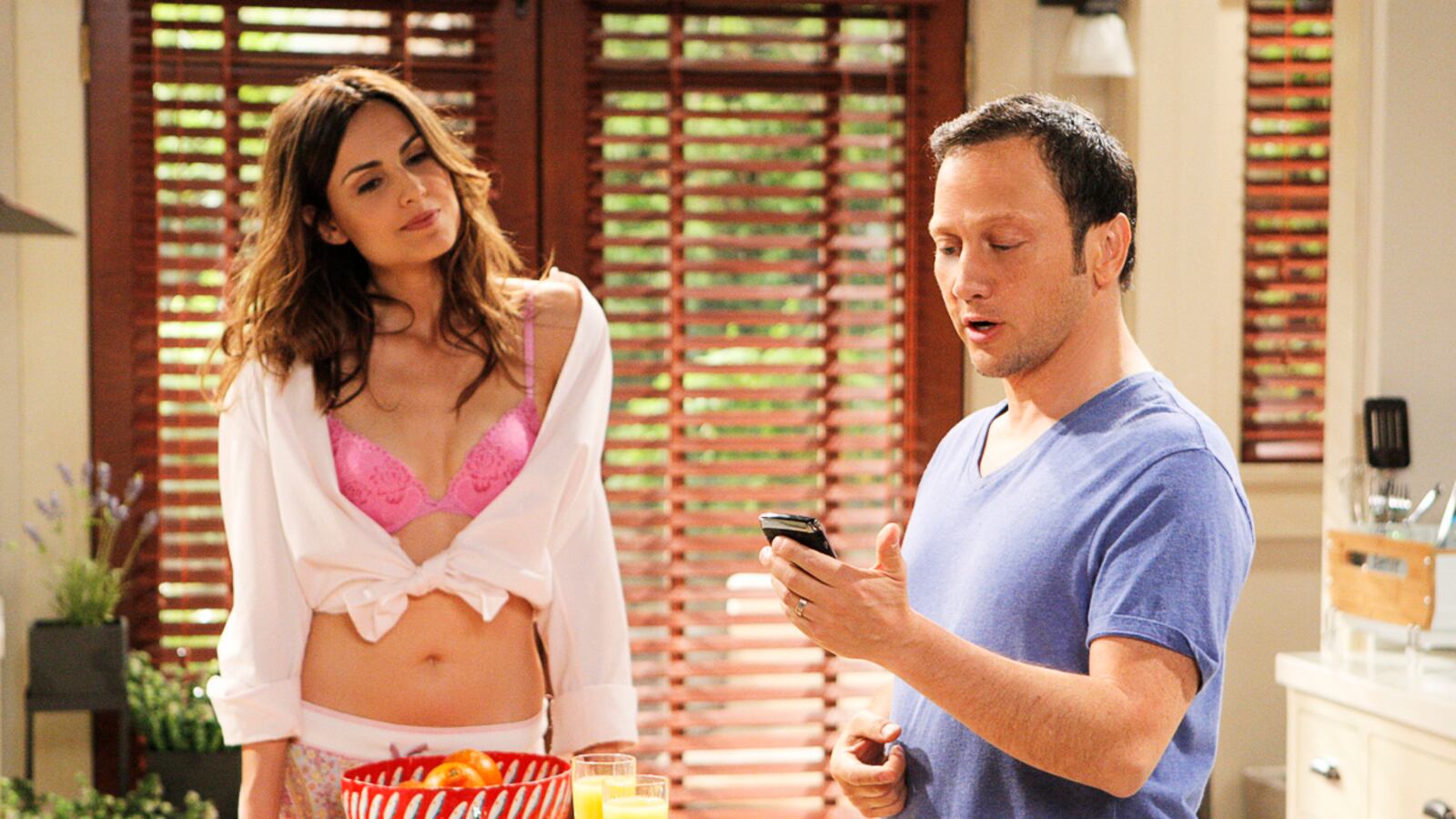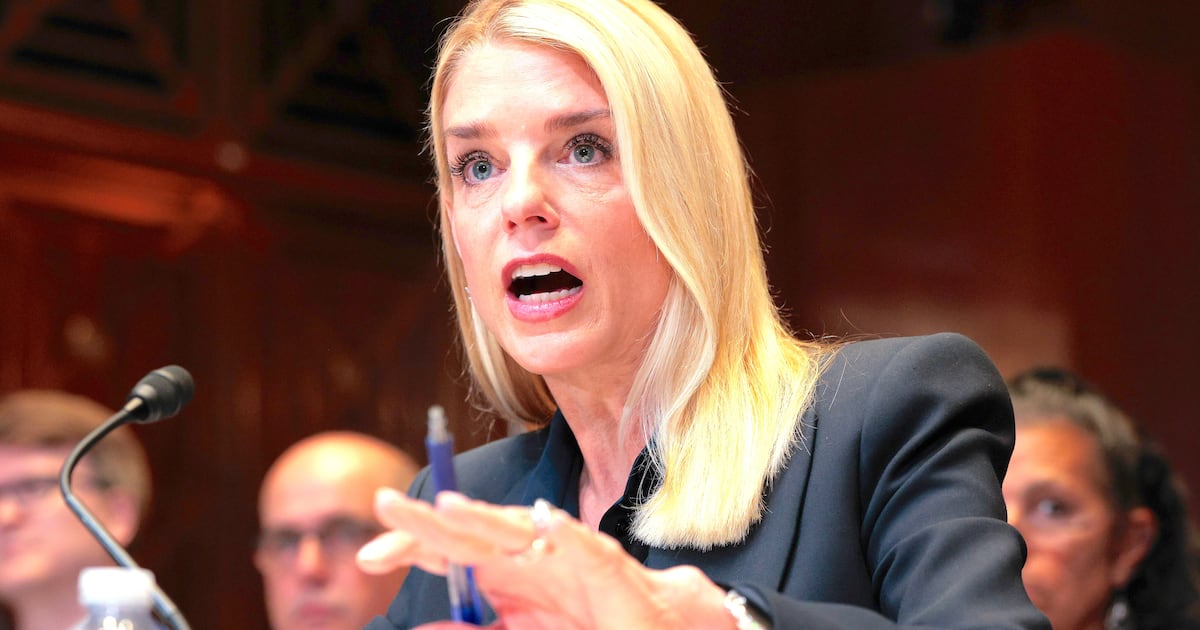The media have lately been celebrating the remarkable comeback of the sitcom, which had seen better days. Modern Family continues to outperform itself; Community dazzles with its inventiveness; Suburgatory perfectly captures the suburbs-are-hell trope with wit and bite; Happy Endings has surprised many by becoming a hit; and CBS’s 2 Broke Girls is poised to become television’s most-watched comedy. But for all the talk about revitalized formats and audience engagement this past fall, this doesn’t account for Work It and Rob, two midseason comedy offerings that are so awful they may in fact be harbingers of the Fall of Man.
While this may be hyperbolic, Rob and Work It do symbolize how far the sitcom format has fallen, at any rate. It’s hard to perfectly capture the intense sense of fiery rage that I felt in watching these hackneyed and humorless failures. Both Rob and Work It are deeply offensive in their own ways, but the real crime is that Rob, which launches on CBS on Thursday, and its ABC sibling lack any real sense of humor. Work It had seemingly plumbed the nadir of the television comedy, and it seemed it couldn’t get any worse. Wrong! It can get worse, and does with Rob.
Rob—which was previously known as ¡Rob! but, for reasons known only to CBS upper management, the network dropped the upside-down exclamation point, making copy editors everywhere sigh with relief—stars Rob Schneider as Rob, a sad sack and OCD-prone gringo who marries Maggie, a drop-dead-gorgeous Mexican-American woman (Claudia Bassols), after dating her for only six weeks. Their wedding—which, naturally, takes place on the spur of the moment at a Las Vegas chapel—comes as a terrible surprise to Maggie’s sprawling family, who never envisioned her with a short, white husband. Hilarity, as they say, is meant to ensue.

It doesn’t. Rob, created by Lewis Morton (Big Lake, Futurama) and executive-produced by Eric Tannenbaum and Kim Tannenbaum (who can claim Two and a Half Men, Running Wilde, Brothers, and quite a few other sitcoms on their résumés), doesn’t exactly scream authenticity. For the pilot, at least, there isn’t a single Latin name among the writers or producers (Schneider, who has an executive-producer credit on the show, can boast a Latina wife), and the series’s first episode offers a wafer-thin appreciation and awareness of Mexican culture, one that doesn’t go beyond guacamole and the occasional use of the Spanish endearment mija (my daughter). This is as deep as things go here, though I kept waiting for a tired piñata scene to arrive. (Perhaps in Episode 2?)
In fact, Rob’s handling of ethnicity and minority culture makes the stereotype-rich 2 Broke Girls appear culturally sensitive by comparison. Putting aside the multicamera format—a perennial CBS favorite—and the painful laugh track, Rob seems more like a parody of a sitcom than an actual comedy that’s been ordered to series, one that the studio and the network have spent money on to develop, produce, market, and promote. Opposites attract, even when they come from different ethnic backgrounds, Rob seems to shrilly scream at the top of its lungs.
Gringo Rob is mistaken for Maggie’s cabdriver! Rob makes a gaffe by blurting about Catholics and birth control when faced by Maggie’s huge family! Maggie’s mother, Rosa (Diana-Maria Riva), looks down on Rob because he’s a—wait for it—gardener! Rob is actually a “landscape architect,” and clearly a well-paid one, judging from his house, but Rosa’s having none of that. “I wish you people wouldn’t use a leaf blower,” she complains at one point. Ah, isn’t it ironic that Mexicans are bothered by noisy gardeners too?
But this is all surface stuff. The deeper one gets into Rob, the worse it truly becomes, as the laugh track seems to taunt the viewer with its false guffaws the more overtly offensive the show gets. Maggie’s father, Fernando (Cheech Marin), owns a car-wash empire that he built with his own hands, but he’s deeply anti-immigration, telling Rob that he wants the United States to “build a wall and patrol it with cannons,” but his less-than-altruistic stance reveals a deep-seated animosity. “I don’t need any more competition,” he says, shrugging, before gleefully admitting that he employs illegal workers. Is this meant to be funny?
Fernando’s brother-in-law Hector (Eugenio Derbez) is an illegal alien himself, one who asks Rob for a $7,200 loan the first time they meet and who tells him that he’s visiting for the weekend but is never leaving. He’s meant to provide some semblance of comic relief, his entrances and exits modeled after Seinfeld’s Kramer, but without the deftness of Michael Richards, depth of character, or humorous dialogue. He’s a leech in a man’s form, who happily swills spoiled sangria and sneaks into Rob and Maggie’s bedroom.
Rob’s bride, Maggie, is as well drawn as a hastily scrawled stick figure. She was dating Rob for six weeks but seems to have never spent any time at his home. Maggie’s career, along with any personal aspirations she might have, is decidedly vague. There’s a line about their meet-cute at a dress shop, where Maggie perhaps works, but the CBS website indicates that she’s a “smart book translator.” This isn’t at all felt in the pilot, where she’s both repeatedly infantilized and sexualized in the course of 20-odd minutes, and given little to do except entice Rob into the bedroom or glare at him angrily for his latest social misstep.
An early scene sums up the failures of this show. Rob, looking for Maggie and her parents in the hopes that she’s told them of the marriage, stumbles into the bedroom of her grieving Abuelita (Lupe Ontiveros), where he knocks over a picture of her late husband, which in turn spills hot wax—from her candle-festooned shrine—onto his crotch. As he drops his pants and swats at his genitals in a masturbation gag that would seem at home on Two and a Half Men, he’s interrupted by Abuelita herself, whom he tries to silence by putting his hand over her mouth, throwing her around like a rag doll, and then forcibly mounting her on the bed.
No, Rob producers, sight gags about raping non-English-speaking Mexican grandmothers after they mistake you for masturbating are not hilarious in any universe or in any language. It’s a particularly horrific sequence that’s played out for laughs as Maggie’s unnamed Abuelita attempts to fight off Rob, but then later offers him a flirtatious wave in a complete about-face. CBS isn’t known for the subtlety of its comedies, though one has to wonder just how this show was pitched to the network’s entertainment president, Nina Tassler, and what she thought of the finished product.
Shows like Rob lower the bar inasmuch as they lower our perception of television as a medium. No, not every show has to aspire to be the next Mad Men or Breaking Bad, but there’s something backward about seeing the inversion of stereotypes as something progressive or subversive. They’re still stereotypes and they still have the same shudder-inducing qualities, whether it’s Mexican-Americans or privileged white dudes, having just magically scored hot wives, dishing them out.
It’s a lesson that Rob, exclamation points or not, should learn sooner rather than later. Or maybe these truly are television’s end times, after all.






